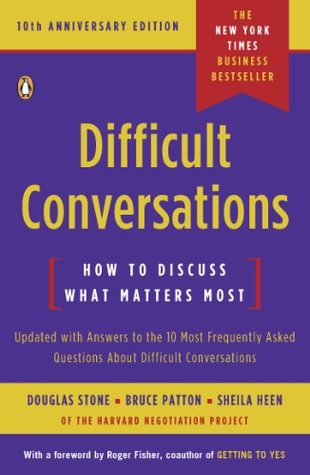More on this book
Community
Kindle Notes & Highlights
Started reading
August 29, 2018
We Treat Ourselves More Charitably. What’s ironic — and all too human — about our tendency to attribute bad intentions to others is how differently we treat ourselves.
When a coworker criticizes your work in front of department colleagues, she is trying to put you down. When you offer suggestions to others in the same meeting, you are trying to be helpful.
When we’re the ones acting, we know that much of the time we don’t intend to annoy, offend, or upstage others. We’re wrapped up in our own worries, and are often unaware that we’re having any negative impact on others. When we’re the ones acted upon, however, our story too easily slides into one about bad intentions and bad character.
Are There Never Bad Intentions? Of course, sometimes we get hurt because someone meant to hurt us. The person we are dealing with is nasty or inconsiderate, out ...
This highlight has been truncated due to consecutive passage length restrictions.
But these situations are rarer than we imagine, and without hearing from the other person, we can’t really know their intentions. Getting Their Intentions Wrong Is Costly Intentions matter, and guessing wrong is hazardous to your relationships. We Assume Bad Intentions Mean Bad Character. Perhaps the biggest danger of assuming the other person had bad intentions is that we easily jump from “they had bad intentions” to “they are a bad person.” We settle into judgments about their c...
This highlight has been truncated due to consecutive passage length restrictions.
Accusing Them of Bad Intentions Creates Defensiveness. Our assumptions about other people’s intentions can also have a significant impact on our conversations. The easiest and most common way of expressing these assumptions is with an accusatory question: “How come you wanted to hurt me?”
What they think we are doing is trying to provoke, accuse, or malign them. (In other words, they make the same mistaken leap in judging our intentions.) And given how frequently our assumptions are incomplete or wrong, the other person often feels not just accused, but falsely accused.
We should not be surprised, then, that they try to defend themselves, or attack back. From their point of view, they are defending themselves from false accusations.
From our point of view, they are just being defensive – we’re right, they just aren’t big enough to admit it. The result is a mess. No one learns any...
This highlight has been truncated due to consecutive passage length restrictions.
Those are the two classic characteristics of the cycle: both parties think they are the victim, and both think they are acting only to defend themselves. This is how well-intentioned people get themselves into trouble. Attributions Can Become Self-Fulfilling. Our assumptions about the other person’s intentions often come true, even when they aren’t true to begin with. You think your boss isn’t giving you enough responsibility.
You assume that this is because she doesn’t trust you to do the work well. You feel demotivated by this state of affairs, figuring that nothing you do will change your boss’s mind. Your work suffers, and your boss, who hadn’t been concerned about your work before, is now quite worried. So she gives you even less responsibility than before. When we think others have bad intentions toward us, it affects our behavior. And, in turn, how we behave affects how they treat us. Before we know it, our assumption that they have bad intentions toward us has come true.
The Second Mistake: Good Intentions Don’t San...
This highlight has been truncated due to consecutive passage length restrictions.
We Don’t Hear What They Are Really Trying to Say The problem with focusing only on clarifying our intentions is that we end up missing significant pieces of what the other person is trying to say.
Working to understand what the other person is really saying is particularly important because when someone says “You intended to hurt me” that isn’t quite what they mean. A literal focus on intentions ends up clouding the conversation. Often we say “You intended to hurt me” when what we really mean is “You don’t care enough about me.” This is an important distinction.
The father who is too busy at work to attend his son’s basketball game doesn’t intend to hurt his son. He would prefer not to hurt his son. But his desire not to hurt his son is not as strong as his desire or need to work. Most of us on the receiving end make little distinction between “He wanted to hurt me” and “He didn’t want to hurt me, but he didn’t make me a priority.”
We Ignore the Complexity of Human Motivations
We Aggravate Hostility — Especially Between Groups


